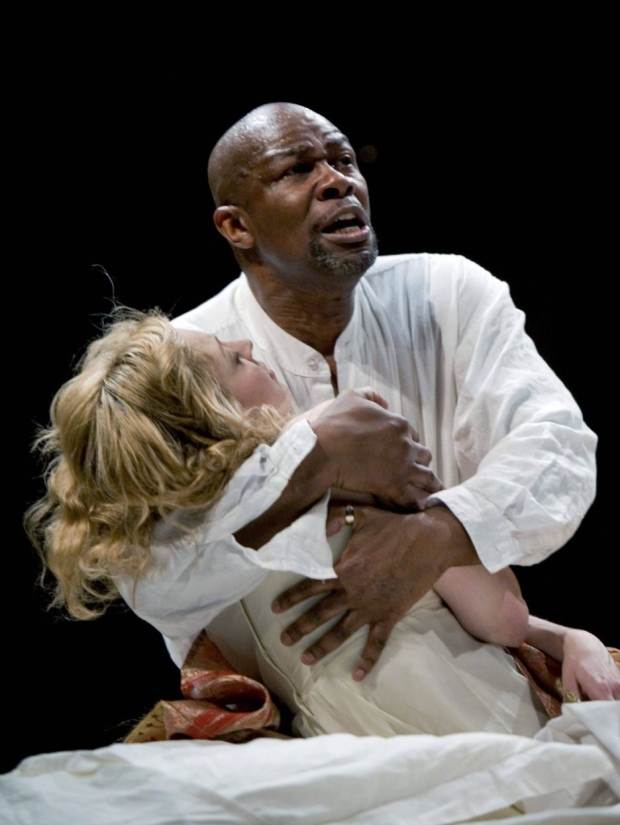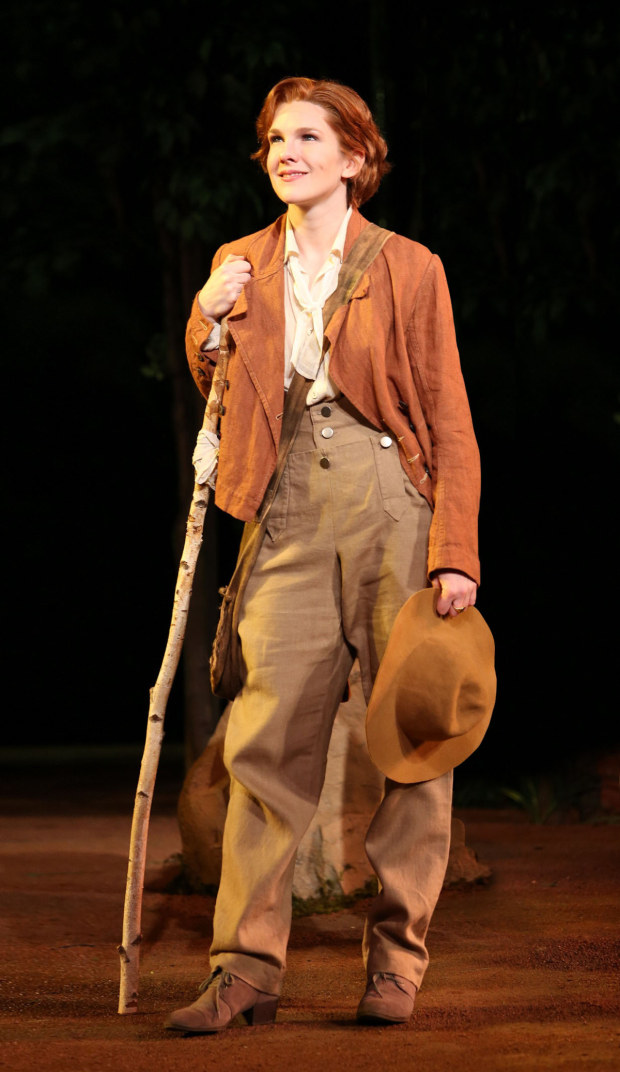Giving Will the Shakes
“To be or not to be translated” — that is now the question.

(© Katie Orlinsky)
They are translating Shakespeare. It's happened countless times before, but this time it's being done systematically, so the news has inspired tantrums by a great many people: The Oregon Shakespeare Festival, esteemed for decades as a place where you could meet the Bard's texts in unadulterated form, is commissioning 36 contemporary playwrights to translate the 39 plays recognized as wholly or partly William Shakespeare's into modern English versions that will presumably be more comprehensible to the ears of today's audiences.
Well, no tantrums here. As a translator myself, I've spent a large part of my life turning foreign plays into speakable stage English. As a production dramaturg, I've spent other chunks of it working with directors and actors on Shakespeare's texts. So the challenges involved don't faze me. If anything, as a playwright-dramaturg-translator, I'm rather ticked at not being on OSF's list myself. Except that I don't think I'd enjoy being behind this particular eight ball: Though unfazed by OSF's project, I'm not holding any high expectations for its results. One or two of the new "translations" may turn out to be playable scripts; a few others may become useful teaching tools. Most are likely to end up on the archival junk heap of literary curiosities that 350 years of attempts to adapt, "correct," and otherwise revise Shakespeare's plays for the changing tastes of this or that later time have already accumulated.
Most of these earlier attempts took far greater liberties than Oregon's project means to, often correcting or censoring Shakespeare's morals, politics, and religion as well as his diction, grammar, and scene structure. The most infamous of them, Nahum Tate's 1681 rewrite of King Lear, pasted a happy ending on the tragedy: Cordelia survives to marry Edgar, and Lear lives long enough to bless their union before dying. You may snicker, but Tate's version held the stage for the next 150 years.
OSF's restrictions will forestall any such absurdity. Its commissionees have been instructed that "there is to be no cutting or editing of scenes and playwrights may not add their personal politics." What they're being asked to do instead is "to examine the play line-by-line and translate to contemporary modern English those lines that need translating." This leaves the rewriters painfully little wiggle room: They can't change any of the things a living playwright would instinctively want to change about the plays, and what they're enjoined to change — the wording — is exactly the part that playwrights, of all people, are best qualified to appreciate.

(© Joan Marcus)
And in this tight spot, the larger question will constantly hang over them: If you change the words to any great extent, does what you have left constitute a play by Shakespeare? Or is the result nothing but a giant bait and switch, a savorless cardboard Shakespeare with the nutrients removed? OSF has even shaken its commissionees' confidence from the start, by announcing firmly that its new "translations" will parallel, not replace, Shakespeare on the Festival's production roster. And undoubtedly, in places that don't care to buy the OSF's streamlining and simplifying approach, Willie the Shakes, as American kids who had to read him in school used to call him, will go on being read, produced, studied, and relished, in the original, by those who are willing to put a little time and effort into his works.
How you apportion that time and effort, how strongly you feel that they are still worthwhile, may be the bigger questions that OSF's project fails to address. If Shakespeare's language is so remote from us as to require this huge systematic translation effort, why should we bother to play him at all? The stories of his plays, after all, don't belong to him; he got them somewhere else, though he doctored and reshaped them considerably to suit himself, the troupe he worked for, and his audience. Why exactly do we bother with him?
This is where all the problems people have about Shakespeare climb in through the window of our doubts. Shakespeare was a totalitarian monarchist, or a radical anarchist. He was a sexist pig, or a gender-questioning sexual subversive. He displays a knee-jerk Christian dogmatism, or a bleak-minded, atheistic pessimism. Finally, Shakespeare was a half-educated hick actor who didn't write his own plays, or he was a sublime God-given genius whose every word is sacred. Sometimes it seems there are as many Shakespeares behind the plays as there are adjectives in their texts.

(© courtesy the Public Theater)
The breadth of this panorama of possibilities shows both why we value Shakespeare — there is so much to him — and why the idea of translating him can seem so very, very preposterous, or conceivably dangerous. Tinker with a dynamo complex enough to have produced this much contention, and it might very well blow up in your face.
Two major cultural misunderstandings give Oregon's project its impetus. One, so huge that I really find it unfathomable and have next to nothing to say about it, is Americans' apathy toward history. For most Americans, the notion that the past is always with us — dormant in our collective memory, tangible in our surroundings — constitutes an offense, or at best a sort of nuisance. Shake it off, tear it down, streamline it, simplify it, rename it. Reducing humanity's cultural heritage to a small number of clickable icons with tweet-length definitions attached is, and has largely been, the American way.
Shakespeare is of course one of those icons, and his iconic status has always been part of the problem — a problem now so aggravated that OSF felt the need to conceive its translation project. It takes only one step to go from Shakespeare the icon, that king of dramatic poets whose every word is sacred, to Shakespeare the ancient, a historical monument so old and meaningful that it is not possible for anyone today to understand a word he wrote.
To mythologize Shakespeare puts him both behind us and beyond us. It is what drives people to found Shakespeare festivals, as well as what makes those festivals, after a certain interval, feel the need to "translate" him. Both impulses — to idolize and to antiquate — have the same effect: They move people away from the immediacy that gives his texts their excitement and their meaning. That immediacy is the great accomplishment of his dramatic poetry, about which I'll have more to say next week.
To read part II of this "Thinking About Theater" column, click here.
Michael Feingold has twice won the George Jean Nathan Award for Dramatic Criticism, most recently in 2015 for his "Thinking About Theater" columns on TheaterMania, and has twice been a finalist for the Pulitzer Prize in Criticism. He serves as chairman of the Obie Awards and has also worked as a playwright, translator, and dramaturg.









